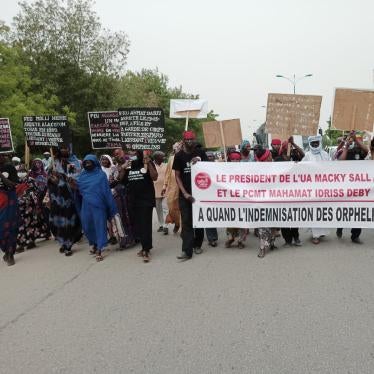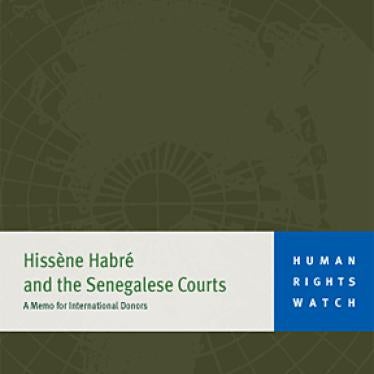Senegal's highest court is to rule March 6 on whether Chad's exiled former president, Hissène Habré, should stand trial in Senegal on torture charges. Habré was indicted last February, but in July an appeals court dismissed the charges, arguing that Senegal had no jurisdiction over crimes allegedly committed in Chad.
In arguments today before the Cour de Cassation, Senegal's highest court, the state prosecutor, Aly Ciré Ba, argued that the charges should be re-instated. This turn-around in the prosecution's position was applauded by advocates for the victims.
"We're delighted the prosecution has taken the position that Senegal must try these crimes," said Reed Brody, advocacy director of Human Rights Watch, one of the organizations that initiated the case. "Today you can't commit atrocities in one country and then claim sanctuary next door."
Lawyers for Habré and for the victims who brought the case, as well as the state prosecutor, presented their arguments in a five-hour hearing before the three-judge Criminal Chamber of the Cour de Cassation. The victims' lawyers, Boucounta Diallo and Sidiki Kaba, noted that the "no safe haven" provision of the 1984 United Nations Convention against Torture, which Senegal ratified in 1986, expressly obliges states to either prosecute or extradite alleged torturers who enter its territory. Under the Senegalese constitution, international treaties, once ratified, override Senegal's legal code. The victims' position was supported by the state prosecutor.
Habré's lawyers, Madické Niang and Helène Cissé, argued that Senegal had no jurisdiction over crimes committed in Chad. Court President Mireille Ndiaye announced that a decision would be rendered on March 6.
In February 2000, Judge Demba Kandji of the Dakar Regional Court indicted Habré on torture charges, and placed him under house arrest. It was the first time that an African had been charged with atrocities by the court of another African country. On July 4, 2000, following Judge Kandji's removal from the case, the Court of Appeals dismissed the charges against Habré, ruling that Senegal had not enacted legislation to implement the Convention against Torture and therefore had no jurisdiction to pursue the charges because the crimes were not committed in Senegal. The dismissal drew protests from the United Nations, Senegal's association of judges, the New York Times and rights activists around the world.
Habré, 57, took power in Chad in 1982, overthrowing the government of Goukouni Wedeye. Habré's one-party regime, supported by the United States and France, was marked by widespread abuse and campaigns against the ethnic Hadjerai (1987) and the Zaghawa (1989). Habré was deposed in December 1990 and has lived in Senegal since.
Habré's indictment in Senegal has also had an impact back in Chad. On October 26, 2000, the Chadian victims who initiated the case in Dakar filed criminal charges in Chadian courts against their direct torturers, many of whom remain in positions of power, for torture, murder, and "disappearance."
The victims' case is being supported by Human Rights Watch, the International Federation of Human Rights Leagues (FIDH), RADDHO, the Chadian Association for the Promotion and Defense of Human Rights (ATPDH), the Chadian League for Human Rights (LTDH), the National Organization for Human Rights (Senegal), the London-based Interights, and the French organization Agir Ensemble.







